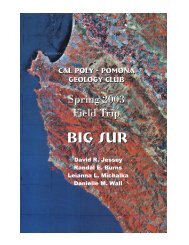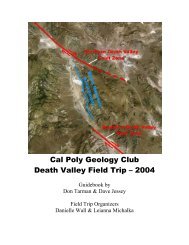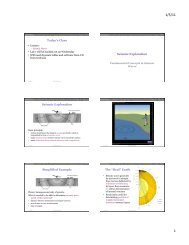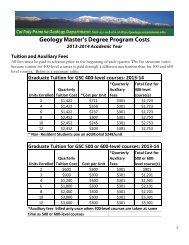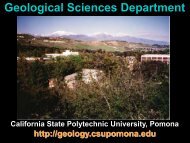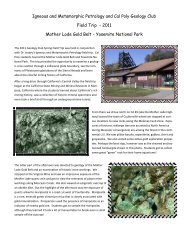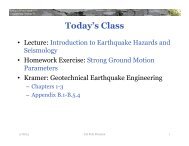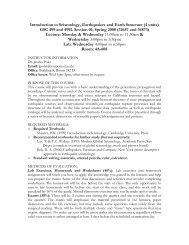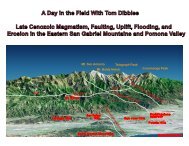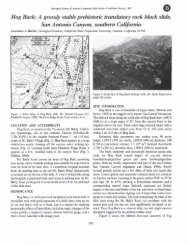Appendices to Qualitative Program Indicators - Geological Sciences ...
Appendices to Qualitative Program Indicators - Geological Sciences ...
Appendices to Qualitative Program Indicators - Geological Sciences ...
Create successful ePaper yourself
Turn your PDF publications into a flip-book with our unique Google optimized e-Paper software.
There's a steady demand for scientists who study the movement and chemistry ...<br />
http://sciencecareers.sciencemag.org/career_development/previous_issues/article...<br />
Page 3 of 4<br />
8/8/2008<br />
SHADES OF GREEN<br />
The broadening of academic research has filtered down <strong>to</strong> the training of M.S. students. Some graduate<br />
programs, such as New Mexico Tech's and the double-M.S. program at the University of Wisconsin,<br />
now require interdisciplinary courses in <strong>to</strong>pics such as surface water, ecology, and economics. Some<br />
hydrologic consulting companies, however, complain that versatility isn't what they need. "We're having<br />
difficulty finding traditional hydrogeologists," says Daniel Stephens, founder and head of a 110-<br />
employee environmental consulting company with offices in New Mexico, Texas, and California. "The<br />
people we're seeing are fewer in number, and their qualifications are thinner." Instead of giving students<br />
a smorgasbord of skills, Stephens says, universities should equip them <strong>to</strong> start work on real projects.<br />
But Wilson, whose department at New Mexico Tech embraced the multidisciplinary approach a decade<br />
ago, says his students are well-prepared <strong>to</strong> learn anything they need <strong>to</strong> know. "At some point, the<br />
employer is responsible for training students in the details of the jobs," he says. Oil companies, he<br />
notes, are happy <strong>to</strong> recruit promising hydrogeologists and train them in petroleum exploration.<br />
If money were the only lure for earth scientists, fossil fuels might be the only fluids in <strong>to</strong>wn. But<br />
hydrogeologists say a strong undercurrent of environmental idealism pervades the field as well. Just as<br />
many senior scientists drew their inspiration from the first Earth Day, some young water experts are<br />
pursuing activist agendas of their own--and carving out new career paths <strong>to</strong> do it.<br />
Pumped up. Trayle Kulshan tests a new well north of Kabul, Afghanistan.<br />
Trayle Kulshan is one of them. After getting her M.S. in hydrogeology from Stanford University in Palo<br />
Al<strong>to</strong>, California, in 2002, she spent 2 years in the Peace Corps in Guinea. Now, as water, sanitation, and<br />
hygiene coordina<strong>to</strong>r for the humanitarian nongovernmental organization Action Contre la Faim (Action<br />
Against Hunger), she plans and oversees projects <strong>to</strong> build wells, latrines, and water networks in<br />
developing countries as far-flung as Afghanistan and the Democratic Republic of the Congo. She<br />
currently is working in Kenya.<br />
Although she is now as much a public-health worker as an earth scientist, Kulshan says her graduate<br />
training gives her a quick grasp of hydrologic conditions as well as skill in collecting, analyzing, and<br />
interpreting other kinds of data and communicating the results. "In grad school, we are all [teaching<br />
assistants] and develop skills as teachers. Every day I am teaching," she wrote by e-mail from Nairobi.<br />
"And I have <strong>to</strong> say I am still a student learning every day as well."



